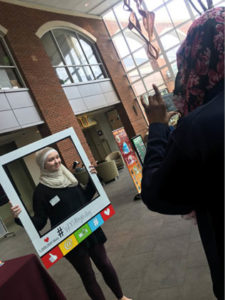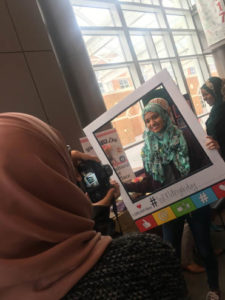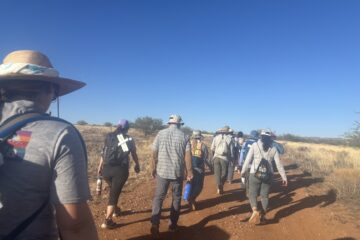As women around the world geared up to celebrate World Hijab Day, Winthrop’s Muslim Student Association (MSA) prepared to make their name known on campus.The MSA just received their charter in the fall of 2017, and for their president, Chandani Mitchell, the annual celebration of the hijab on Feb. 1 seemed like the perfect time to make their entrance.
“We wanted to have an organization where Muslims could connect with each other; but also to bridge relations with other religious groups on campus and open up dialogue,” said Mitchell.
World Hijab Day was started in 2013 by Nazma Khan, a Muslim woman who emigrated from Bangladesh to New York at the age of 11. According to their website, Kahn founded this day as a “means to foster religious tolerance and understanding by inviting women to experience the hijab for one day.”
The MSA and their co-sponsors for the events, the multicultural sorority, Zeta Sigma Chi, sought to educate the campus through two events. The first involved a table during common time that was filled with beautiful and vibrant headscarves. The members of the MSA invited people to try on a hijab and learn more about an everyday thing for millions of women worldwide.
Secretary of the MSA, Sauliha Mitchell expressed her excitement on sharing the hijab with other women. 
“This is a basic part of my everyday life. I know a lot of people who see it and might not understand why we wear it, and I just want to give people that understanding,” said Mitchell. “Most likely, you’ll meet someone like me, so if you have that understanding, you’ll get why she wears that.”
The first event of the day received great intrigue and participation as noted by Dorothy Huther, the external relations chair for Zeta Sigma Chi.
“I’m so glad we’re getting such a great turn out, I was a bit worried just because of the stigma but its going great,” said Huther.
The second event held that evening involved a guest speaker, Sally Adnan, explaining more of the history and meaning of the hijab, followed by a panel discussion.
Adnan outlined how the word “hijab” comes from the word arabic word hajaba meaning barrier or partition. Adnan personally sees it as a “barrier from danger.” She showed how the hijab is outlined in the Quran as a dress code and behavior code for both men and women. As well as how many of the world’s major religions advocate for a form of physical and behavioral modesty similar to the hijab.
Adnan explained how her hijab is her “shield and shining armor.”
“Some say it makes women invisible and I agree,” Adnan said. “It makes me invisible to temptation. It is a constant reminder to my duty that I carry with me on my head and shoulders.”
The panel discussion allowed the audience to get a deeper picture of what it is like to wear the hijab on a day to day basis.
“It is definitely something that takes getting used to,” said panelist Nicole McMullen, a Winthrop graduate who converted to Islam several years ago.
“Now it makes me confident, it’s just a part of me and I can’t imagine my day without it.” said Ayaba Shatuid, another recent Winthrop graduate and one of the founding members of the MSA.
 Another member of the panel, Ghada Bedwan, who is a student in Charlotte, spoke about her love of how wearing the hijab “breaks societal standards and typical female objectification.” “It tells the world we will not conform to your standards,” said Bedwan.
Another member of the panel, Ghada Bedwan, who is a student in Charlotte, spoke about her love of how wearing the hijab “breaks societal standards and typical female objectification.” “It tells the world we will not conform to your standards,” said Bedwan.
The panel was in agreement that one of the hardest things they must deal with is people’s perceptions of what the hijab means. They all noted how strangers staring and even verbal harassment have become all too common to them.
“I want people to understand this is our commitment to God, and our choice and no one forces us to do this,” said Shatuid. “This shouldn’t be intimidating because we’re just regular people with regular lives.”
Allee Campbell was a freshman in attendance of the event. “It’s just something I didn’t know a lot about and when I heard about this event I wanted to know more,” said Campbell. “I definitely learned a lot.”
The goal of World Hijab Day is to allow people from all walks of life to experience why women wear the hijab, and the MSA did just that.
“It’s become such a comfort for me. I enjoy wearing it and it just makes me who I am,” said Sauliha Mitchell.



